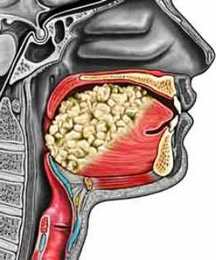Cancer language
Description tongue cancer
Tongue cancer is a subgroup of head and neck cancer. Cancer develops from the squamous cells of the language. This results in a local tumor growth, which can later spread to other bodies.
Cancer occurs, when the body's cells divide uncontrollably and form a build-up (weight) of cloth, called tumor. The term cancer refers to malignant tumors, that can invade nearby tissues and spread to other parts of the body. Benign tumors do not spread to other organs.
Cancer of the language is often referred to a group of tumors of the oral cavity, which includes cancer of the lips, cancer of the hard palate, cheek cancer, floor of the mouth cancer (of the mouth underneath the front part of the tongue), or cancer right. These tumors are collectively known as oral cancer.

Causes of tongue cancer
The causes of cancer are unknown language. Studies show, that there are certain factors, increase the risk of disease:
- Cigarette smoking, cigar or pipe;
- The use of chewing, snuff, or other tobacco products;
- Alcohol abuse.
Risk factors for tongue cancer
Factors, which increases the risk of tongue cancer:
- Paul: male;
- Poor oral hygiene and dental;
- Age: 40 and older;
- Irritation of the mucous membranes in the mouth due to smoking and alcohol consumption;
- The presence of ulcers in the mouth;
- Genetic predisposition.
Symptoms of tongue cancer
These symptoms, except for tongue cancer, They may be caused by other, less serious diseases. If you experience any of them, consult a doctor.
- Cutaneous, swelling or sores on the tongue;
- Difficulty swallowing;
- Painful sores in the mouth;
- Numbness or difficulty in movement language;
- Changes in speech (due to the inability to move the tongue when talking);
- Pain when chewing and speaking;
- Bleeding from the tongue.
Diagnosis of tongue cancer
Tongue cancer can be detected by a dentist, or a doctor during the medical examination.
To confirm the diagnosis the doctor will ask about your symptoms and medical history, and perform a physical examination. Tests may include:
- Inspection of language to find tumors;
- Using a device with a light source and a camera on the end, to examine the base of the tongue;
- Biopsy language – removal of a tissue sample to test the language it for cancer cells;
- Computed tomography of the head – type of X-ray, which uses computer, to take pictures of the mouth;
- Chest X-ray, to determine, whether the cancer has spread to the lungs.
Cancer Treatment Language
Once tongue cancer is found, appointed Tests, allowing to determine the extent of its spread. The treatment method depends on the stage of the disease and the patient's health.
Tongue cancer surgery
Held removal of a cancerous tumor, surrounding tissue, and, perhaps, neighboring lymph nodes. The operation is often the preferred treatment, when the tumor is on the visible side of the tongue, when it is sufficiently small (less 2 cm), and when it is lateralized to one side and does not affect the base of the tongue.
Radiation therapy (or radiotherapy) tongue cancer
Radiation therapy – Use of radiation, allowing to kill cancer cells and shrink tumors. This method is used, when the cancer is at the back of the tongue.
Chemotherapy for cancer language
Chemotherapy – the use of drugs to kill cancer cells. It is used primarily in conjunction with radiation therapy, If the operation can not be.
Rehabilitation and follow-up after treatment of tongue cancer
After treatment may be assigned:
- Therapy, aimed at improving the movements of the tongue, chewing and swallowing;
- Working with a speech therapist, if the operation affects the ability of speech;
- Careful monitoring of the mouth, throat, esophagus, light, to prevent recurrence or spread of cancer.
Cancer Prevention language
To reduce the likelihood of tongue cancer, proceed as follows:
- Do not smoke or use tobacco products. If you smoke or consume tobacco products, you must get rid of the habit;
- Avoid excessive use of alcohol;
- See your doctor regularly for early detection of cancer.
